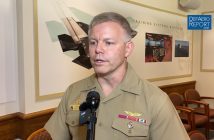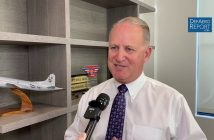Peter Van Praagh
Halifax International Security Forum
November 2018
Vago Muradian: Welcome to the Defense and Aerospace Report. I’m Vago Muradian here in Washington, DC at the offices of the Halifax International Security Forum, one of the world’s most important security gatherings out in Halifax, in Nova Scotia, Canada, that starts on the weekend before Thanksgiving. A full year of planning. And we’re talking to Peter Van Praagh who is the man, the myth and the legend who makes this happen every year. Peter, your 10thanniversary. I know I was there from the second onwards, and it’s really an extraordinary event. Talk to us a little bit about the theme this year. We’ve had so much change in the security environment. It’s the 100thanniversary commemoration of the end of World War I. So many different factors coming in. Trumpism. Talk to us a little bit about what the mission, the themes and the topics for this year’s conference are going to be.
Peter Van Praagh: Vago, it’s great to have you here, and I have to tell you, I really appreciate talking to you every year. I appreciate your being at the forum every year. And indeed, you’ve become a fixture at the forum. So thanks so much for being there every year.
Mr. Muradian: It’s an honor.
Mr. Van Praagh: So Halifax International Security Forum, as you’ve noted, takes place the weekend before Thanksgiving every year. This is our 10thedition. What makes Halifax a little bit different is that it’s really for like-minded democracies only. So we have representatives from over 70 countries, but people who all share values. They might have disagreements about how we get to a final, to end a problem or a crisis but everybody has the same idea about working together and building stronger democracies that lead to economic opportunity and lasting peace.
So this year, as you mentioned, is the 100thanniversary of the end of World War I to the month. November 1918, and now we’re in November 2018. What we’re asking ourselves this year is as a community of democracies, are we tired of winning? Do we have what it takes to keep going? There’s been an incredible winning streak for a century. World War I, of course, we thought at the time that that might be the end of war altogether. We thought the same thing after the end of the Cold War in 1989. Of course after World War I we had World War II, and after 1989 we have terrorism and all sorts of crises that we’re dealing with now.
But as a community of democracies led by the United States of America do we have what it takes to keep going? Of course, I believe the answer is yes. But it requires work, it requires concentration, and it requires talking and listening to each other.
Mr. Muradian: It’s always a star-studded national security cast. You guys have an incredible blend of some folks who have retired but are still giants in the field as well as very current folks. Who are going to be some of the highlight speakers? I know, I think it’s pretty safe to say the senior Canadian leadership will be there.
Mr. Van Praagh: Yes. Canadians will be there, of course. The Minister of National Defence of Canada, Minister Harjit Sajjan; the Chief of Defence Staff of Canada, General Vance. But in many ways, even though this event takes place in Canada, you’re talking to me from our headquarters here in Dupont Circle, Washington, DC, and in many ways, this is the American security conference. In fact, more senior Americans travel to Halifax, Canada for this security event than any other security conference be it in the United States or internationally. So this year from the United States, — and why is that?
Before I tell you who all is coming, I’ll tell you that the world does need American leadership. And I think everybody, it’s two years now, it will be two years since President Trump’s election, 2016. We’ll be one week from the mid-term elections. And I think everybody wants to understand still what American leadership is all about at this time.
So from the United States, we will have senior military leadership, a delegation from the Pentagon this year. We’re quite thrilled to tell you that General Dunford, Chairman, of the Joint Chiefs of Staff, will be coming, and that’s the first time we’ve had a Chairman of the Joint Chiefs, so that’s really exciting for us, and he’ll be talking globally, as well. Even though we’re on the coast of the North Atlantic, this is a global event. So we have Admiral Davidson coming, the Commander of Indo-PACOM, traveling from Hawaii to be with us to talk about issues related to Indo-Asia Pacific Region. Also, we have Admiral Karl Schultz, the head of the United States Coast Guard with us this year as well. So we’re really proud to have all of them with us.
As well, we will have an incredible congressional delegation this year led by Senators Jeanne Shaheen and Senator Tillis of North Carolina. We have more than 10 percent of the United States Senate is going to be with us in Halifax, Nova Scotia, which again demonstrates not only the significance of Halifax as a meeting place but the significance of American leadership in the world. So we’re thrilled to welcome them all.
I think just by being all together — Americans, Canadians, but from 70 countries, democracies, shared values — we are demonstrating to the world and to those who would challenge us that no, we’re not tired of winning. That there’s still a lot of winning left to do.
Mr. Muradian: Senator McCain was always a very important part of the forum. He took the time to talk to just about everybody who was there, because everybody, he always had a few minutes for everybody there. Cindy McCain is going to be there. You have a new award to honor him. Talk to us a little bit about John McCain’s shadow and who the first winner of the McCain prize is going to be.
Mr. Van Praagh: Thank you, Vago. I mean the truth is, I feel very honored and privileged to have known Senator McCain. I knew him prior to the forum. He did call me a friend, and that was always, it always made me feel incredibly proud just when he used that word. But also to see him at the forum every year was something that was always a highlight for us. And yes, he will be missed.
Senator McCain really stood for what I believe is what’s best in America. That is strength, democracy, dignity. Understanding the need for every individual in the world needs dignity. And we’re going to miss him this year. We’re very grateful to Mrs. Cindy McCain who will be with us this year to present the first John McCain Prize for Leadership and Public Service, and this is a prize that is being awarded at Halifax International Security Forum, but in fact, awarded by the McCain family. The first inaugural prize will be going to the people of Lesbos, Greece. And that is Mrs. McCain highlighting the refugee crisis and the outstanding and heroic efforts of the people of Lesbos to welcome people to their community. This goes back now many years when they were flooded with refugees coming across.
So this is something that’s going to be a highlight. We have people coming from Lesbos, the community, who are going to be telling their stories. And I think Mrs. McCain is quite, it’s important to her that this refugee crisis is something that’s highlighted at a security event because it really matters to all of us.
Mr. Muradian: One of the things that makes Halifax unique is this cross-cutting, everything from hard power is discussed to women’s issues to migration to technology. The nexus, the small dinners that happen on Saturday night are always a highlight because you end up learning about something you didn’t think you would even be that interested in. I know there are people who are like aw God, you know, I got such and such dinner because I didn’t get into that dinner, and everybody walks away from it being like wow, I mean this was just such a great conversation, whatever the topic’s been about.
But increasingly over time, right, there’s a lot of nuance, there’s a lot of span, and yet it seems like the public discourse has descended into very much more simplistic solutions to what are complicated problems. What are some ways of maybe changing, right? I mean you’re somebody who plays very significantly in the discourse simply by how you architect each one of these discussions and conferences. What are some ways to change the global conversation on some of these complicated problems? Whether it’s on climate, whether it’s on migration, whether it’s on technology, and whether it’s on security or even economy, economics, which at the end of the day can potentially avert crisis. Right?
We were at the forum when John Allen introduced the idea of the Marshall Plan for the Middle East in order to be able to get to some of these fundamental issues. There are folks who look at that template and model that we pioneered after World War II to look at Central America and say hey look if we did a Marshall Plan we could solve some of these underlying challenges or at least get a leg up on them.
How do you think the discourse has to change?
Mr. Van Praagh: Vago, this is not only a good question, it’s the fundamental question of this year and maybe even our time. This is a community of democracies, and so the military leaders there, the experts, the elected officials, and the senior officials, they do have bosses other than the people down the hall from them. The bosses are the people of their countries. I think that that is something that actually needs to be remembered. There are a lot of legislators, there are going to be a lot of legislators from many countries at Halifax this year, and one of the messages I think is that yes, you are leaders, but you need to communicate. Because we can’t, as leaders, do what we want. I think that we have found that out, that the people of all of our countries have expectations. One of their expectations is to understand what their leaders are doing.
So I think fundamentally the challenge at Halifax, but not just at Halifax, just in the day-to-day conversation, is to explain to the people of our democratic countries why the decisions that are being made are being made. Why these challenges are important to them and to their children and to their families and what we’re doing about them. What leaders are doing about them.
I think understanding that and not just making decisions in a vacuum and thinking that that’s okay, because it’s not — it’s no longer okay. I think that one of the lessons of the last few years is that better communications with our populations and with our communities is not only welcome, it’s fundamentally needed because democracy requires it and the people of our countries, everybody who’s represented at Halifax are really thirsty to understand what’s going on.
So I think that really is part of the conversation this year. I think everybody wants to be included. This is not a conversation that is exclusive to experts. It’s not a conversation that’s exclusive to the military. It’s a conversation that really affect everybody. So all of our panels, our plenary panels are available online, and we really encourage people to go to our web site, HalifaxTheForum.org to watch the sessions as they go forward.
Mr. Muradian: Well, it’s going to be an honor and a pleasure to be covering it and to attend. Now I have to ask you the big question. Is everything totally ready? The hotel does such a terrific job, but I know that your staff has been running almost 24×7 to get everything ready. Hundreds of participants from all around the world. How close are you to being totally ready?
Mr. Van Praagh: We’re ready. Vago, we’re ready. And you’ve been there before, so you know all the different moving parts. But part of what we do, aside from the conversations, is we build an atmosphere so that people who don’t know each other get a chance to meet each other, and within minutes there’s a warm relationship building.
So we’re ready. We’ve got a fantastic team. I’m proud of all of them. And I’m really looking forward to welcoming you back to Halifax.
Mr. Muradian: It’s always an honor and a pleasure like I said. Very much looking forward to seeing you there. It definitely sets your intellectual needles for the coming year, Peter. Thanks very much. Best of luck, and I look forward to seeing you and your team up there.
Mr. Van Praagh: Thank you so much, Vago. Thank you.
30




